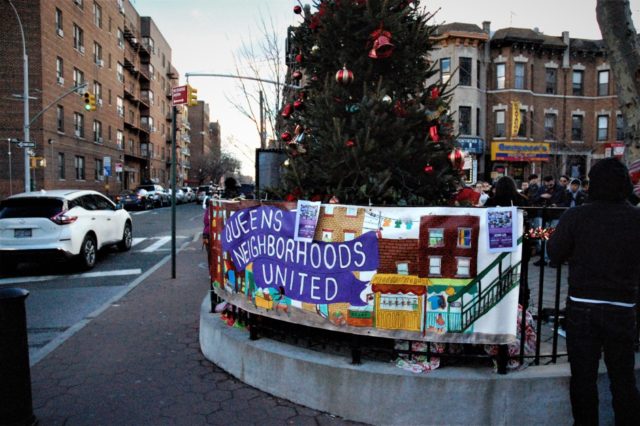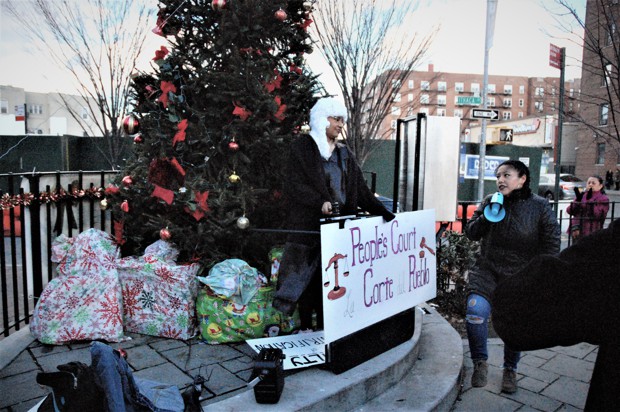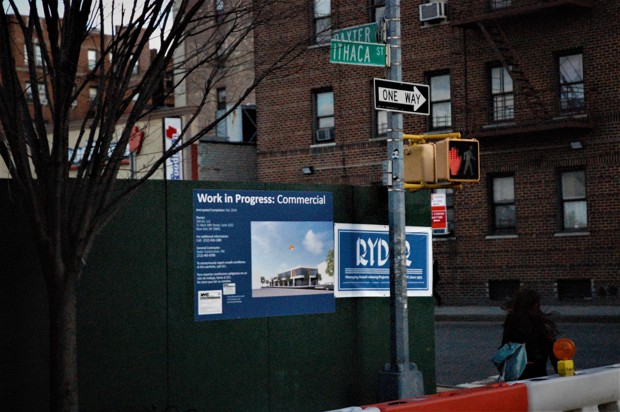
A People’s Court puts Target “on trial” just beyond a Queens Neighborhoods United sign on January 6, 2019, in Jackson Heights, Queens. (Amir Khafagy/CityLab)
Queens Neighborhoods United says a plan to build a Target in Jackson Heights violates zoning restrictions and will strain infrastructure.
On a cold, sunny January afternoon, an eclectic crowd packed into Dunningham Triangle, a small pedestrian plaza that straddles a busy intersection in the Jackson Heights neighborhood of Queens, New York. In one of the most ethnically and culturally diverse communities in the country, they gathered to voice their opposition to the proposed Target store slated to be built in the empty lot across the street. It was more than just a protest: It was an act of guerrilla theater, featuring a “People’s Court” to prosecute Target for the crimes of gentrification and displacement.

While the community resistance to Amazon’s HQ2 in another Queens neighborhood has garnered more headlines, that’s just one fight against the incursion of large corporations in what some residents see as a wide-ranging struggle over the future of the borough.
The mock trial was organized by a local activist group, Queens Neighborhoods United (QNU). For more than two years, QNU has been trying to prevent developers Sun Equity Partners and the Heskel Group from building a Target-anchored mall in Jackson Heights. QNU filed a zoning challenge to the mall based on its contention that opening a big-box store in a predominately residential neighborhood violates the existing zoning ordinance R6/C1-3 —an R (residential) zoning with a C 1-3 (commercial) overlay—which only allows for residential use or small retail and service shops that serve local consumer needs.
That’s where the ambiguity lies. QNU argues that “typical consumer needs” applies to business such as laundromats, small restaurants, bodegas, and small retailers—not department stores, which are restricted to other classifications of commercial area. The developers contend that the Target in question is not a big-box commercial store but rather a new “small-format” store, Target’s strategy for neighborhoods that cannot hold their typical 130,000-square feet store.
Target currently operates 65 of these more modestly scaled stores across the country in predominantly urban areas; they average around 40,000 square feet. The company has said that it plans to open 130 such stores across the country in 2019, with four in New York City alone.
To gain an exemption from the zoning restrictions, the developers applied to the city council for spot rezoning—changing the zoning status of one particular parcel of land, often without community input. That’s a tactic that has become increasingly common over the years in neighborhoods like Long Island City.
The contested site in Jackson Heights was once home to the nearly century-old Jackson Heights Cinema. The cinema closed in 2014 when the owners couldn’t afford the increased rent. In 2016, Sun Equity and the Heskel Group purchased the property, demolished the theater, and announced plans to build “The Shoppes at 82nd Street.” Per the original plans, the project was to consist of a 13-story, 120-unit building, with Target and other retailers occupying the ground floor. To gain support for spot rezoning, they promised that 30 percent of the units would be “affordable.”
As opposition to citywide neighborhood zoning efforts mount, developers as well as city planners are increasingly frustrated by the city’s extensive Uniform Land Use Review Process, commonly called ULURP, which lasts for months and involves public consultation. The site of the future Amazon HQ2 was going through the ULURP process when New York City was planning to build a technology center for the community in the location. When the city agreed to cede the tech center’s location to Amazon, New York State involvement meant that the Amazon project was able to supersede the extensive city rezoning process and save the company a potentially ugly public consultation and blockage by local politicians. Spot rezoning is another tactic that allows developers to massage the process. Rezoning one particular parcel of land often draws less attention and opposition than a rezoning proposal for a neighborhood or block.
“Spot rezoning is not illegal, but it tends to go against urban planning best practices,” said Sam Stein, a lecturer in urban studies at Hunter College. “You’re not supposed to make one-off decisions between the city and the developers. You’re supposed to think about the needs of the neighborhood in its relation to the city as a whole. [Developers] have the power to hire the most connected lobbyists and lawyers; it’s like they’re almost daring the community to stop them.”
After the plans for the Target-anchored mall in Jackson Heights were released, QNU mobilized against the project. The Queens Community Board Four, the local representative body made up of community members, voted against the project in March 2018. Yet city council members have a great deal of power over what happens in their district and the local councilman, Francisco Moya, initially supported the rezoning request. As opposition mounted, however so did the pressure on Moya. According to Ryan Sit, director of communications for the councilman, Moya decided he could no longer support the project when talks with the developers stalled regarding the amount of affordable housing units that would be available.
The developers pivoted, withdrawing the rezoning request and submitting plans for a smaller building, still with a Target as anchor. But QNU argues that the new plan still violates current zoning regulations. (Neither Target nor the developers responded to requests for comment.)
After the developers withdrew the rezoning request, Moya reversed course and has since publicly opposed the project. Late last year, he released a statement opposing the new plan: “It’s been obvious from day one that the Target slated to open at the Shoppes at 82nd Street near the border of Elmhurst and Jackson Heights would have devastating effects on local businesses and the character of these neighborhoods,” Moya said. “I have no monopoly on this perspective—it would have been clear to anyone who had asked. This project is and has always been unwanted in our community and deeply unpopular among nearly every resident I’ve spoken with about it. I welcome the zoning challenge and I hope this sets a precedent that major corporations cannot elbow their way into neighborhoods without being called to account.”
When asked for comment on the reversal of Moya’s position, his communications director Ryan Sit said, “When the councilman first dealt with the project, he wanted to see what was the best possible deal he could bring to the community. There is zero affordable housing in this community, so the council member wanted to bring the best possible plan to the community that would help as much as possible.”
Neighborhoods like Long Island City, Astoria, and Flushing are undergoing rapid redevelopment projects that have reshaped the borough’s landscape. A 2014 New York City Comptroller report found that between 2000 and 2012, residential rent in Jackson Heights, Elmhurst, and Corona had increased by approximately 23 percent. Last year, a StreetEasy study found that Elmhurst and Jackson Heights saw rent increases of 36 percent and 31 percent over the course of the past seven years. Opponents of the HQ2 and Target projects fear that those developments will only speed up these trends.
“What both Target and Amazon represent is the corporate takeover of our neighborhoods,” said QNU member Carina Kaufman-Gutierrez. “It’s displacing our working-class communities in the interest of profit.”
New York State Senator Jessica Ramos agrees. “The overall corporatization of our communities is concerning because companies like Amazon will further drive gentrification and change the fabric of our community,” she said. “I don’t see how we can keep the American dream alive in this part of Queens, which has historically been welcoming to immigrants, when corporations will make real-estate prices unaffordable.”
Throughout the course of the two-hour community trial, local residents and members of QNU, Chhaya Community Development Corporation, LIC Coalition and Hate Free Zone testified passionately against the developers and Target for the crimes of gentrification and displacement, and found them guilty. They then proceeded to march to the development site and place a pasteboard of the verdict on the scaffolding.
Across the street, Lina Parra, owner of the 40-year-old store, Daval Jewelry, watched from the doorway. An immigrant from Colombia, Parra leased the store four years ago; she too opposes the Target project. “I love my job and I love the people” she said as she helped a regular customer put a new battery in her watch. But with the Target development looming, rent has increased on the block and small businesses have already begun to feel the pressure as rent.
A few days after the community trial, community members packed a New York State Supreme Court room on January 10, in support of QNU’s suit against the developers. They argued before the judge to have the developer’s building permit annulled. Construction on the project has begun and QNU says that with the case pending the developers have been fast-tracking construction efforts at the site in a race against the clock. They requested that the judge either shut down the project entirely or impose a temporary stop-work order until the ruling by the city’s Board of Standards and Appeal, expected in March.

The Supreme Court judge refused to issue a stop-work order and deferred the case back to the Board of Standards and Appeal. If they had been successful, it would have been the second stop-work order on the project. (One was issued in the fall of 2018 after QNU submitted a zoning challenge to the Department of Buildings. The stop-work order was revoked after the developer withdrew the rezoning request and submitted plans for the smaller building.)
“The more construction goes on the more likely the Board of Standards will vote in the developers favor,” said QNU’s Carina Kaufman-Gutierrez. “That’s why it’s so important that we get the restraining order.”
At the root of much of the controversy surrounding the Target is the power of cities to use zoning laws in determining their future.Zoning has the ability to restrict buildings, density, and regulate the types of business that operate in a particular area; such was the case in the “cleaning up” of Times Square. “The federal government has the most power over public housing, the state has the most power over rent control so the only thing the city has left is its land-use laws,” said Stein.
Some cities and activists have taken note. In 2006, San Francisco enacted a progressive zoning law that will limit chain stores with 11 or more U.S. locations from monopolizing retail in the city. In New York the Chinatown Working Group, a coalition of local community activists, have been fighting since 2008 for the city to implement their community-led rezoning plan that calls for the creation of a “Special District” that would span Chinatown and the Lower East Side. It would create zoning protections for those neighborhoods, as well as protecting the character and affordability of those communities.
Despite being disappointed by the Supreme Court decision, QNU is prepared to see the fight against the Target through. They view what is happening in Jackson Heights as one front in a war for the soul of communities everywhere. “The danger is, if we don’t challenge Target, national retailers will think they could put department stores anywhere in the city,” said Paula Segal, Community Development Project attorney for QNU. “We will no longer have residential districts. It will just be mall NYC.”
This article is from CityLab.

